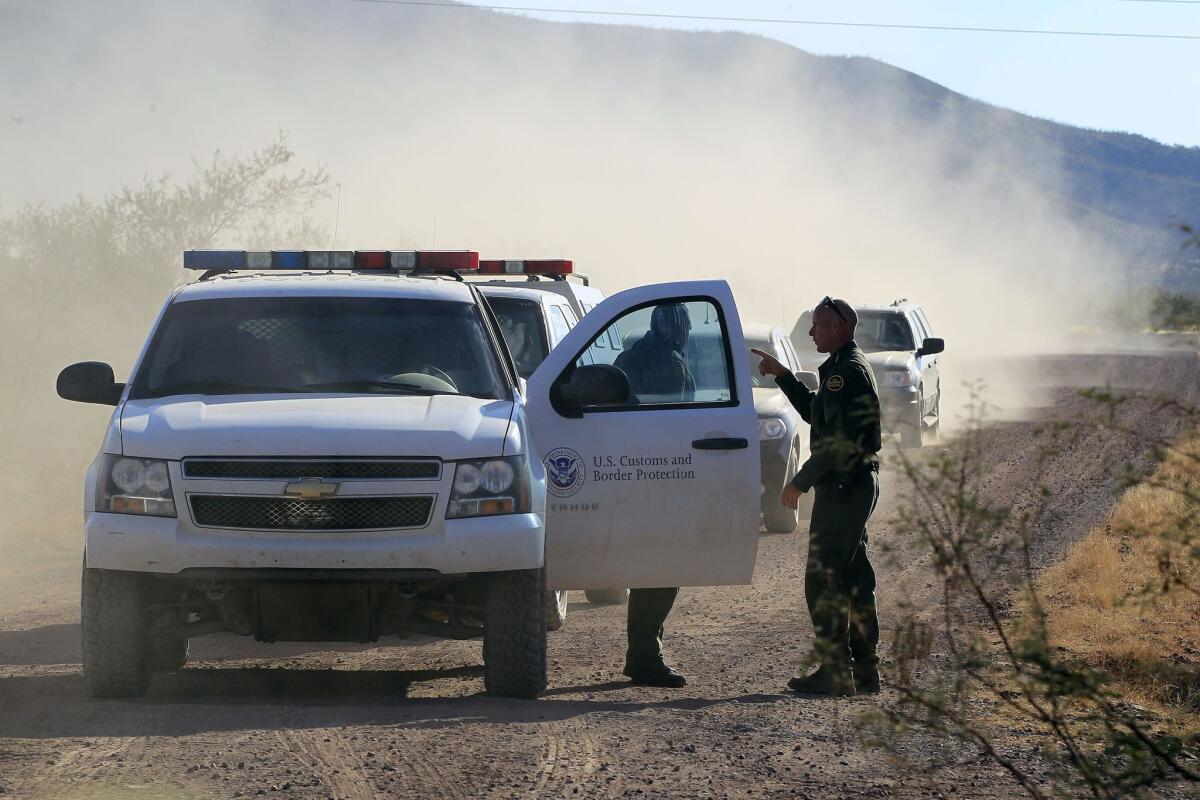U.S. border agency under pressure to reform use-of-force policies

WASHINGTON — Lawmakers and watchdog groups called Friday for tougher restrictions on the use of deadly force by U.S. border agents and more transparency in the investigation of killings, including the release of an independent audit that recommended reforms in the U.S. Customs and Border Protection agency’s “use-of-force” policies.
The comments followed a report Thursday by the Tribune Washington Bureau that revealed that a 21-page audit — which the border agency commissioned but has refused to release to the public or Congress — cited examples of border agents unnecessarily stepping in front of fleeing cars to justify firing at passengers, and responding to rock-throwing with firearms.
Conducted by the nonprofit policy group Police Executive Research Forum, the review — obtained by the Tribune Washington Bureau — found 19 deaths had occurred in the 67 cases it examined. It criticized the agency for a “lack of diligence” in investigations and urged changes to prevent border agents from shooting at vehicles unless occupants are trying to kill them, and barring agents from shooting people who throw things that cannot cause serious physical injury.
Rep. Zoe Lofgren (D-San Jose) said Friday that she found the report “very disturbing,” and that she had to obtain it from other sources because the Department of Homeland Security, which oversees the border agency, declined to release it.
“There are recommendations for reform that must be implemented by the executive branch,” said Lofgren, the top Democrat on the Immigration Policy and Border Security Subcommittee. She criticized the agency for a lack of transparency in internal investigations, complaining that a case “just disappears into a black hole and that’s a problem.”
Chris Rickerd, an attorney at the American Civil Liberties Union, said during a conference call with reporters Friday that Homeland Security should release the report “along with a full accounting of investigations into the 27 deaths,” referring to an ACLU count of border-control-related deaths since 2010.
The border agency has resisted adopting the audit’s recommendations, according to documents obtained by the Tribune Washington Bureau. The agency has argued that its agents would be put at greater risk if they accepted proposed limits on the use of force, or publicly revealed the details of their security policies.
Amid the growing backlash, however, Homeland Security Secretary Jeh Johnson is reconsidering the agency’s response to the two recommendations.
Spanish-language media — particularly in Mexico — have been abuzz about the report. El Universal, a leading Mexican newspaper, said that Mexican authorities had complained for years that border agents who kill Mexicans are rarely punished and that the results of investigations have not been published for years.
During a House Homeland Security Committee hearing this week, Johnson vowed to release the border agency’s official policy for using force. Watchdog advocates expressed concerns that parts of the document might be redacted.
Two border-state congressmen have said they will introduce bipartisan legislation to create a commission and require stronger reporting from the agency.
“We’ve been very frustrated at the lack of transparency, information and ability to exercise oversight in Congress so we are going to mandate it in law,” Rep. Beto O’Rourke (D-Texas), who is cosponsoring the legislation with Rep. Steve Pearce (R-N.M.), said in an interview Friday.
Immigration activists also called for greater transparency in Homeland Security’s internal efforts to investigate and reprimand agents for using deadly force. They urged the department to release its use-of-force policies, as other law enforcement agencies do.
Border agents “have to be held to the same standards,” said Andrea Guerrero, executive director of Alliance San Diego and co-chairwoman of the Southern Border Communities Coalition. “They don’t have the right to operate above the law.” She said border agents should be equipped with nonlethal weapons such pepper-ball guns.
“What we are finding in a lot of these incidents [is that] they are not holding nonlethal options except for a baton,” she said.
FOR THE RECORD:
An earlier version of this article quoted Andrea Guerrero, executive director of Alliance San Diego and co-chairwoman of the Southern Border Communities Coalition, as saying border agents should be equipped with pepper spray. She advocated use of pepper-ball guns, not pepper spray.
Staff writer Cindy Carcamo contributed to this report from Tucson.
More to Read
Sign up for Essential California
The most important California stories and recommendations in your inbox every morning.
You may occasionally receive promotional content from the Los Angeles Times.










